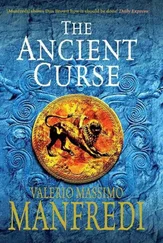Valerio Manfredi - The Ides of March
Здесь есть возможность читать онлайн «Valerio Manfredi - The Ides of March» весь текст электронной книги совершенно бесплатно (целиком полную версию без сокращений). В некоторых случаях можно слушать аудио, скачать через торрент в формате fb2 и присутствует краткое содержание. Жанр: Исторические приключения, на английском языке. Описание произведения, (предисловие) а так же отзывы посетителей доступны на портале библиотеки ЛибКат.
- Название:The Ides of March
- Автор:
- Жанр:
- Год:неизвестен
- ISBN:нет данных
- Рейтинг книги:4 / 5. Голосов: 1
-
Избранное:Добавить в избранное
- Отзывы:
-
Ваша оценка:
- 80
- 1
- 2
- 3
- 4
- 5
The Ides of March: краткое содержание, описание и аннотация
Предлагаем к чтению аннотацию, описание, краткое содержание или предисловие (зависит от того, что написал сам автор книги «The Ides of March»). Если вы не нашли необходимую информацию о книге — напишите в комментариях, мы постараемся отыскать её.
The Ides of March — читать онлайн бесплатно полную книгу (весь текст) целиком
Ниже представлен текст книги, разбитый по страницам. Система сохранения места последней прочитанной страницы, позволяет с удобством читать онлайн бесплатно книгу «The Ides of March», без необходимости каждый раз заново искать на чём Вы остановились. Поставьте закладку, и сможете в любой момент перейти на страницу, на которой закончили чтение.
Интервал:
Закладка:
The sun had begun to set. He had at most another hour and a half of light, sufficient to reach his next stop along the left bank of the Reno. There he would decide whether to set off again or remain for the night. He slowed down when he could feel his mount straining, not wanting to wear him out. He was an infantryman and he’d learned to get to know horses and understand their needs. But he was convinced that Caesar was in great danger and that the threat was imminent. It wasn’t so much Nebula’s hints as his own instinct, the same feeling that, during his guard shifts on the Gallic campaigns, had allowed him to sense the enemy arrow an instant before it was let loose.
Caupona ad Salices, a.d. VIII Id. Mart., hora duodecima
The Willows Inn, 8 March, five p.m.
Publius Sextius reached the banks of the Reno just short of Bologna and turned right, heading south as he followed the river upstream, according to the directions on Nebula’s map. He didn’t reach the inn, which acted as a changing station, until the sun had already dipped below the mountains. He entered, eager to change his horse. At the door he noticed a little statue of Isis. It wasn’t particularly well crafted, but it made a certain impression nonetheless. Inside, the servants were getting ready to light the oil lamps in the rooms, taking the oil from a jar at the end of the courtyard.
He felt tired. His old wounds were bothering him, as they always did when the weather was bad. The little he’d eaten at the previous station wasn’t enough to keep him going. He tied the horse’s reins to a post and went to find the station attendant, who turned out to be busy playing dice with the innkeeper.
He showed the attendant his credentials and watched the man’s embarrassment at being caught neglecting his duty. But Publius Sextius waved off his anxiety.
‘I’m not an inspector. I’m a simple traveller and I need your advice.’
‘Whatever I can help you with, centurion.’
‘I’m in a hurry, but I don’t know whether to continue on or stop for the night.’
‘I suggest,’ replied the attendant, ‘that you stop and rest. You’re not looking too good and in a short while it will be pitch black out there. Don’t risk it.’
‘How far is the next rest stop?’ asked Publius Sextius.
‘A little over three hours from here. It depends how fast you’re going.’
‘That depends on the horse you give me.’
‘So you want to leave?’
‘That’s right. It won’t be completely dark for at least an hour. Then I’ll see. Before I go I’ll have a hunk of bread and a little of whatever you’ve got. Change my horse. He’s outside tied to a post. Give me the best you have and I’ll remember you.’
‘Of course,’ said the attendant promptly, dropping his dice. ‘This is our innkeeper. He’ll serve you some dinner while I prepare the finest horse in the stables. Why are you in such a hurry, if I may ask?’
‘No, you may not,’ replied Publius Sextius curtly. ‘Get moving instead.’
The attendant did as he was told and the centurion soon set off again. The temperature was falling rapidly because of the snow still covering great swathes of the mountainside, frosting the air as it swept down the icy gullies.
Publius Sextius told himself that he was worrying too much, that there was no reason to think anything was about to happen so soon. But it relieved him to know that other couriers were already on their way, making it much more probable that the message would reach its destination.
He hoped the couriers would be equal to the task. The state had been lacerated by rival factions for too long now; even the local administrations had been infiltrated by men of different and conflicting loyalties.
Any lingering reflections of the sunset had been doused and the sky, clear now and deep blue, twinkled with its brightest stars. A crescent moon took shape over the white crests of the Apennines and the horseman felt even more alone on the deserted road, his only company the pounding of the horse’s hoofs and its heavy breathing.
Mutatio ad Medias, a.d. VIII Id. Mart., prima vigilia
The Medias changing station, 8 March, first guard shift, seven p.m.
As soon as darkness fell, while the others were preparing for dinner and lamps flickered on inside and outside the inn to guide in any latecomers, the man who had been unloading the sacks of wheat climbed the stairs that led to the upper balcony.
His move did not escape the grey-caped man. Under cover of the shadows that lined the portico, he stealthily reached the stairs and crept up behind him without making a sound, stopping at a door that the man had left half open.
The building was topped by a kind of tower that rose about twenty feet over the rest of the construction. Once the wrestler had reached the upstairs balcony, he walked over to this tower and used the steps built into the wall to reach its top. Out of sight now, he took wood from a readied stack and lit a fire inside a sort of cast-iron basket supported by a tripod. The wind soon whipped up the flames. The wrestler walked to a little door on the western side of the tower, opened it and retrieved a sackcloth bundle. Inside was a large, polished bronze disc. He used this to project the light of the fire towards a point high on the Apennines where someone was hopefully waiting for his signal and would understand. He made wide gestures with his arms, alternating and repeating them. The air was becoming quite chilly and the wrestler felt his chest burning so close to the flames, while his back was freezing in the cold night that was getting blacker and blacker by the moment.
The clanking of dishes and drinking jugs wafted up from below, along with the good-natured bawling of the guests, but the man didn’t take his eyes off the white blanket of the mountain. Although it was surrounded by darkness, it emanated an immaculate glow all its own.
He finally made out a red spot that became bigger and bigger until it was a pulsing red globe. The signalman up on the summit had received his message and was responding.
Down below, the man in the grey cloak didn’t dare go up the tower stair: he had no desire to provoke a run-in with that animal. Even from the balcony, he could tell that the man was sending a signal, so he just flattened himself against the wall and waited for the reply.
In Monte Appennino, Lux Fidelis, a.d. VIII Id. Mart., prima vigilia
The Apennine Mountains, Faithful Light, 8 March, first guard shift, seven p.m.
The man at the signal station held a canvas screen that he raised and lowered over the fire, but the wind was picking up, making his task much more difficult. The terrace at the outpost was covered with icy snow and behind the building stretched a forest of fir trees that were bent under the weight of the recently fallen snow. A hatch suddenly opened in the floor and the station commander emerged, wrapped in a coarse woollen cloak with a fur-lined hood. He was an army officer, an engineer.
‘What are they sending?’ he asked.
The signalman leaned the tablet on which he’d written the message close to the light of the fire. ‘ “The Eagle is in danger. Warn Cassia VIII.” Do you know what that means? Do you know who the Eagle is, commander?’
‘I do know and it means trouble. Terrible trouble. How many men have we got?’
‘Three, including the one who just sent us the signal.’
‘The wrestler?’
‘Yes, him, plus the two we have here.’
‘The wrestler will be leaving as soon as possible, if he hasn’t left already. The other two will set off immediately from here. They’re used to travelling at night. I’ll talk to them myself.’
The light pulsing from the top of the Medias tower stopped. Transmission of the message was complete.
Читать дальшеИнтервал:
Закладка:
Похожие книги на «The Ides of March»
Представляем Вашему вниманию похожие книги на «The Ides of March» списком для выбора. Мы отобрали схожую по названию и смыслу литературу в надежде предоставить читателям больше вариантов отыскать новые, интересные, ещё непрочитанные произведения.
Обсуждение, отзывы о книге «The Ides of March» и просто собственные мнения читателей. Оставьте ваши комментарии, напишите, что Вы думаете о произведении, его смысле или главных героях. Укажите что конкретно понравилось, а что нет, и почему Вы так считаете.












